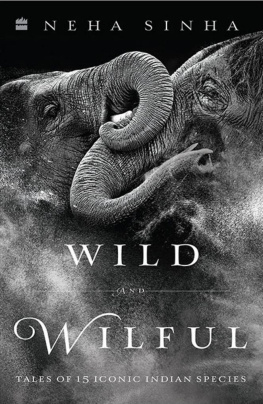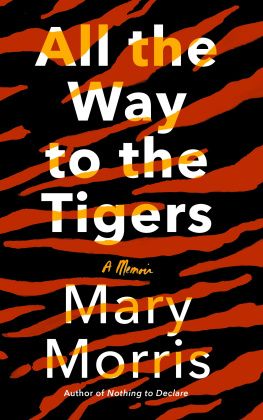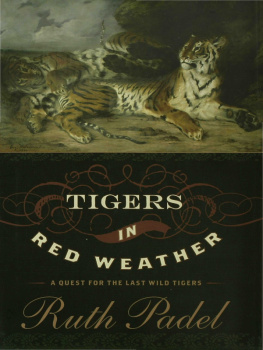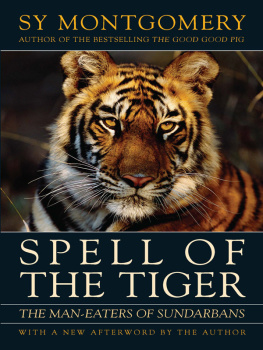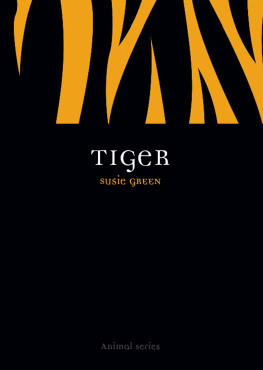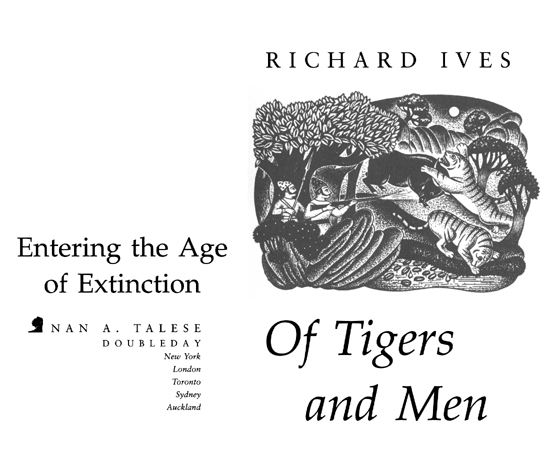PUBLISHED BY NAN A. TALESE
an imprint of Doubleday
a division of Bantam Doubleday Dell Publishing Group, Inc.
1540 Broadway, New York, New York 10036
D OUBLEDAY is a trademark of Doubleday, a division of Bantam Doubleday Dell Publishing Group, Inc.
Illustration by Marc Burckhardt
Library of Congress Cataloging-in-Publication Data
Ives, Richard, 1946
Of tigers and men: entering the age of extinction / Richard Ives.
p. cm.
1. TigersAsia. 2. Endangered speciesAsia. 3. Wildlife conservationAsia. 4. Ives, Richard, 1946 . I. Title.
QL737.C23I94 1996
599.74428dc20 9515421
eISBN: 978-0-307-81915-4
Copyright 1996 by Richard Ives
All Rights Reserved
v3.1
For Christina
Contents
And God blessed them, and God said unto them, Be fruitful, and multiply, and replenish the earth, and subdue it: and have dominion over the fish of the sea, and over the fowl of the air, and over every living thing that moveth upon the earth.
Genesis 1:28
Aprs dinnombrables dynasties de cratures gigantesques, aprs des races de poissons et des clans de mollusques, arrive enfin le genre humain, produit dgnr dun type grandiose, bris peut-tre par Le Crateur.
Honor de Balzac, Le Peau de Chagrin
Prologue
T HE WONDERFUL THING about a chance encounter is that you never know where it may lead.
I had arrived at my hotel in Calcutta in the wake of a train journey that was supposed to require twelve hours but that, in circumstances comic enough to make even the most jaded traveler weep bitter tears, ended up lasting thirty-six. Because I was exhausted, almost out of my mind from lack of sleep, what I wanted most was a hot shower, something decent to eat, something to drink, and a nice bed where I could, quite literally, stretch out and rest in peace.
My first glance at the hotel, however, was not encouraging. Though its name, garnered from a usually dependable guidebook, suggested a charming hostel surrounded by an infinite expanse of greenery bordered by beds of dewy roses, the reality that presented itself was considerably less appealingan infirmary-green building, seemingly as old as British India itself, squeezed into a narrow corner lot on a filthy side street not far from the Maidan. The garden turned out to be nothing more exotic than a patio, which is to say a painted concrete slab equipped with several sets of metal tables and chairs, each set clustered protectively under a gaudy umbrella, the entire ensemble ringed with half a dozen enormous trees and about a thousand potted plants, most of which were liberally spattered with chalky white crow droppings.
Crows, the gray-collard variety so common in Indian towns, were everywhere, scolding, squawking, and pecking, chasing each other from branch to table to potted plant, seemingly involved in some kind of corvid gang warfare, their raucousness almost but not quite sufficient to drown out the blare of automobile horns, the clamor of irate motorists, emanating from the street outside. In my exhausted state, somewhat bug-eyed, all I could do was gaze around and sigh.
Noticing that some thoughtful person had recently hosed off the tables and chairs, I walked over to a table that did not seem too strategically placed under an overhanging branch and took a seat. I ordered a drink from a passing waiter, which arrived rather quickly. It was just as it was crossing my mind that perhaps things were not as bad as they seemed that I heard a voice inquire, Just arrived?
Uncertain at first to whom the question was directed, I turned around in my chair and saw an Indian gentleman sitting at a table nearby, half concealed by a wilted potted palm. Movie-star handsome, in his late forties or early fifties, he was elegantly dressed in a sports jacket and pullover. I judged him instantly to be an aristo, or perhaps a movie actor: in India, only people with lots of money dress like this.
Yes, I said.
Youve come from Delhi?
From Nepal.
Ah, Nepal He sighed as if the word held for him some special significance. Sizing me up as he raised his glass, he asked, First time in India?
No, Im a veteran. This is my sixth visit.
Sixth! He smiled. You must enjoy this country, then. You are American, I think?
Is it that obvious?
Not really. But at the same time I am quite certain that you are not from Texas.
How can you tell? I asked. No cowboy hat?
He laughed at the gibe. Would you care to join me? he asked after a moment. Ill have to be going in a few minutes, but I thought Id have another drink before running off.
It was a friendly offer, one that made me realize that I was perhaps more in the mood for company than I had reckoned. Rising from my chair, drink and bottle in hand, I walked over to his table and introduced myself. Standing to greet me, he shook my hand and told me his name; then, indicating the chair across the table from him, said, Have a seat.
Spotting one of the plume-turbaned waiters who had suddenly appeared at the back of the garden, my new acquaintance barked an orderwhether in Hindi or Bengali or some other Indian tongue, I could not tellthen turned back to me and asked, Would you like your drink freshened up? Some ice perhaps? I told him no and the waiter was dismissed with a nod. Settling back in his seat, he said, So what has brought you to this country a sixth time?
Curiosity.
It killed the cat.
Im thinking of writing a book.
A book about India?
A book about tiger.
His eyes flashed, as though perhaps he thought I might be joking. He gazed at me flatly. You are a biologist, then?
A naturalist. I lead wildlife tours.
You bring tourists to this country from the United States?
Ill be leading my first tour here in India in about a week. Ive been leading tours to Nepal for the last three years.
And in Nepal, where do you take your tourists?
We go trekking, usually in the Annapurnas. Then sometimes we spend three or four days in Chitwan Park.
Ah yes, Chitwan A sort of living postcard, isnt it? With the snowy Himalaya as a backdrop? I expect that it shall remain so as long as the army is there to protect it. You stay at Tiger Tops, I imagine?
Sometimes.
You have seen tiger there?
Several times.
Always from a hide, with the tiger attracted to a bullock set out as bait?
Yes.
And what did you think of the baiting?
Impressive. But not really so very different from seeing a tiger at the zoo, or at the circus.
But you were impressed with the cats themselves?
Of course. How could one not be?
And now that you have seen a tiger, you want to write a book about him
I started to explain. But at that moment the waiter arrived with the ordered drink. Glancing my way, my interlocutor said Cheers, and the waiter, interpreting this as a dismissal, turned and walked off. For a moment or two we enjoyed our drinks in silence, my new acquaintance studying me over the rim of his glass. Lowering it at last, he said, And what do you think of Calcutta?
Calcutta. Now there was a subject for a book.
The memory of the taxi ride that had brought me from Howrah station to the hotel suddenly played before my eyes the noise, the drifting fog of automobile exhaust, the tidal movement of the crowds, the handless beggar tapping his knobby stumps against my half-opened window, the wretched family at the side of the road picking its way through a small mountain of suppurating refuse. How could I tell him what I really thoughtthat Calcutta was the end of the line, the last stop in that part of Asia which was fast becoming a vast human dung pile? Couldnt, obviously. So I hedged. Ive always found it a very interesting city.



